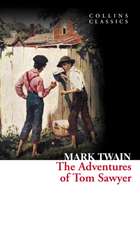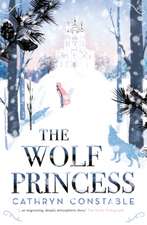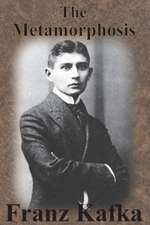The Secret Garden: Collins Classics
Autor Frances Hodgson Burnetten Limba Engleză Paperback – iul 2013 – vârsta de la 12 ani
| Toate formatele și edițiile | Preț | Express |
|---|---|---|
| Paperback (99) | 24.28 lei 3-5 săpt. | |
| Harper Collins Publishers – iul 2013 | 24.60 lei 24 ore | |
| Dover Publications – 23 aug 1994 | 24.28 lei 3-5 săpt. | |
| WORDSWORTH EDITIONS LTD – 5 feb 1993 | 28.12 lei 3-5 săpt. | +6.27 lei 4-10 zile |
| WORDSWORTH EDITIONS LTD – 15 ian 2018 | 28.33 lei 3-5 săpt. | +7.09 lei 4-10 zile |
| Penguin Publishing Group – iul 2003 | 38.21 lei 3-5 săpt. | |
| Bantam Books – 31 dec 1986 | 38.21 lei 3-5 săpt. | |
| HarperCollins Publishers – 20 dec 2010 | 42.66 lei 3-5 săpt. | +11.10 lei 4-10 zile |
| UNION SQUARE & CO – 5 sep 2023 | 43.82 lei 3-5 săpt. | +16.55 lei 4-10 zile |
| Oxford University Press – 10 mar 2011 | 44.71 lei 23-29 zile | +20.50 lei 4-10 zile |
| Penguin Books – 5 mar 2008 | 44.90 lei 24-35 zile | |
| Random House – aug 2012 | 45.61 lei 24-35 zile | +22.10 lei 4-10 zile |
| CREATESPACE – | 47.33 lei 3-5 săpt. | |
| World Scientific Publishing Company – 16 ian 2024 | 48.16 lei 3-5 săpt. | +7.10 lei 4-10 zile |
| Arcturus Publishing – feb 2020 | 48.32 lei 3-5 săpt. | +7.67 lei 4-10 zile |
| Andersen Press Ltd – 4 iul 2024 | 48.60 lei 3-5 săpt. | +8.64 lei 4-10 zile |
| Arcturus Publishing – sep 2021 | 49.20 lei 3-5 săpt. | +10.88 lei 4-10 zile |
| ALADDIN PAPERBACKS – 30 aug 2022 | 49.30 lei 3-5 săpt. | |
| Faber and Faber – iul 2015 | 49.83 lei 3-5 săpt. | +13.15 lei 4-10 zile |
| Little Brown Book Group – 12 oct 2017 | 49.95 lei 3-5 săpt. | +28.99 lei 4-10 zile |
| CreateSpace Independent Publishing Platform – | 50.79 lei 3-5 săpt. | |
| CREATESPACE – | 52.76 lei 3-5 săpt. | |
| UNION SQUARE & CO – 20 mai 2025 | 55.02 lei 3-5 săpt. | +18.85 lei 4-10 zile |
| ALMA BOOKS – 21 apr 2016 | 55.87 lei 3-5 săpt. | +11.11 lei 4-10 zile |
| CreateSpace Independent Publishing Platform – | 57.01 lei 3-5 săpt. | |
| CREATESPACE – | 57.39 lei 3-5 săpt. | |
| HarperCollins Publishers – 5 mar 2020 | 62.25 lei 3-5 săpt. | +10.26 lei 4-10 zile |
| Penguin Books – 6 feb 2025 | 62.62 lei 3-5 săpt. | +11.58 lei 4-10 zile |
| SWEET CHERRY PUBLISHING – 23 mai 2024 | 62.78 lei 3-5 săpt. | +12.22 lei 4-10 zile |
| CANTERBURY CLASSICS – 10 mar 2013 | 63.21 lei 24-36 zile | |
| CreateSpace Independent Publishing Platform – | 64.10 lei 3-5 săpt. | |
| – | 64.99 lei 3-5 săpt. | |
| CREATESPACE – | 66.01 lei 3-5 săpt. | |
| – | 66.21 lei 3-5 săpt. | |
| CREATESPACE – | 68.61 lei 3-5 săpt. | |
| CREATESPACE – | 70.80 lei 3-5 săpt. | |
| CREATESPACE – | 71.64 lei 3-5 săpt. | |
| CreateSpace Independent Publishing Platform – | 72.93 lei 3-5 săpt. | |
| CREATESPACE – | 74.04 lei 3-5 săpt. | |
| CREATESPACE – 30 iun 2012 | 74.37 lei 3-5 săpt. | |
| CREATESPACE – | 77.36 lei 3-5 săpt. | |
| CREATESPACE – | 77.36 lei 3-5 săpt. | |
| Denton & White – | 78.01 lei 3-5 săpt. | |
| CREATESPACE – | 78.40 lei 3-5 săpt. | |
| Hueber Verlag GmbH – 12 iun 2025 | 78.48 lei 17-23 zile | +6.79 lei 4-10 zile |
| – | 78.57 lei 3-5 săpt. | |
| CREATESPACE – | 78.64 lei 3-5 săpt. | |
| – | 78.70 lei 3-5 săpt. | |
| CREATESPACE – | 79.53 lei 3-5 săpt. | |
| – | 83.83 lei 3-5 săpt. | |
| CREATESPACE – | 84.32 lei 3-5 săpt. | |
| Klett Sprachen GmbH – 9 iun 2023 | 85.08 lei 17-23 zile | +7.90 lei 4-10 zile |
| NICK HERN BOOKS – 4 iul 2024 | 87.82 lei 3-5 săpt. | +7.10 lei 4-10 zile |
| Klett Sprachen GmbH – 15 mai 2025 | 91.18 lei 17-23 zile | +8.46 lei 4-10 zile |
| – | 91.26 lei 3-5 săpt. | |
| Klett Sprachen GmbH – 5 mai 2020 | 95.93 lei 17-23 zile | +8.91 lei 4-10 zile |
| Aegypan Press – 31 mar 2008 | 101.51 lei 3-5 săpt. | |
| CREATESPACE – | 103.61 lei 3-5 săpt. | |
| Les prairies numériques – 13 noi 2020 | 107.68 lei 3-5 săpt. | |
| CREATESPACE – | 110.43 lei 3-5 săpt. | |
| Baker & Taylor Publisher Services – 30 ian 2025 | 113.21 lei 24-35 zile | +53.70 lei 4-10 zile |
| – | 113.73 lei 3-5 săpt. | |
| CREATESPACE – | 113.84 lei 3-5 săpt. | |
| – | 118.78 lei 3-5 săpt. | |
| – | 125.27 lei 3-5 săpt. | |
| Candlewick Press (MA) – 23 feb 2010 | 135.48 lei 3-5 săpt. | |
| BROADVIEW PR – 20 dec 2024 | 136.89 lei 3-5 săpt. | +30.30 lei 4-10 zile |
| Alpha Editions – 2 ian 2019 | 137.46 lei 3-5 săpt. | |
| Outlook Verlag – 25 sep 2019 | 236.47 lei 3-5 săpt. | |
| West Margin Press – 2 dec 2020 | 60.17 lei 6-8 săpt. | |
| – | 65.75 lei 6-8 săpt. | |
| – | 68.60 lei 6-8 săpt. | |
| Digireads.com – apr 2019 | 71.57 lei 6-8 săpt. | |
| Rupa Publications India Pvt Ltd. – 5 iun 2023 | 73.45 lei 6-8 săpt. | |
| – | 73.56 lei 6-8 săpt. | |
| SMK Books – 21 noi 2011 | 75.74 lei 6-8 săpt. | |
| – | 76.52 lei 6-8 săpt. | |
| Aziloth Books – 4 mar 2015 | 77.19 lei 6-8 săpt. | |
| – | 82.38 lei 6-8 săpt. | |
| CREATESPACE – | 85.29 lei 6-8 săpt. | |
| LIGHTNING SOURCE INC – 27 sep 2018 | 91.13 lei 17-23 zile | |
| – | 95.15 lei 6-8 săpt. | |
| CreateSpace Independent Publishing Platform – | 102.97 lei 6-8 săpt. | |
| Samuel French Ltd – 7 iul 2014 | 103.50 lei 6-8 săpt. | |
| Bibliotech Press – 21 iul 2020 | 103.74 lei 6-8 săpt. | |
| Rupa Publications India Pvt Ltd. – 20 iun 2018 | 114.40 lei 6-8 săpt. | |
| Blurb – oct 2019 | 123.80 lei 6-8 săpt. | |
| Read & Co. Children's – 30 ian 2020 | 126.33 lei 6-8 săpt. | |
| Sovereign – 26 noi 2012 | 136.37 lei 38-44 zile | |
| Simon & Brown – 30 iun 2011 | 149.31 lei 38-44 zile | |
| Simon & Brown – 31 mar 2011 | 149.31 lei 38-44 zile | |
| Simon & Brown – 26 sep 2018 | 156.51 lei 38-44 zile | |
| Simon & Brown – 30 sep 2011 | 163.26 lei 38-44 zile | |
| Simon & Brown – 31 oct 2011 | 165.23 lei 38-44 zile | |
| TREDITION CLASSICS – 30 noi 2011 | 178.29 lei 6-8 săpt. | |
| Echo Library – 30 noi 2005 | 218.43 lei 38-44 zile | |
| – | 360.68 lei 6-8 săpt. | |
| 180g – sep 2025 | 663.58 lei 6-8 săpt. | |
| – 26 ian 2012 | 28.34 lei Precomandă | |
| Pushkin Press – 12 mar 2026 | 64.54 lei Precomandă | |
| Hardback (37) | 47.90 lei 3-5 săpt. | +26.21 lei 4-10 zile |
| CHARTWELL BOOKS – 14 dec 2021 | 47.90 lei 3-5 săpt. | +26.21 lei 4-10 zile |
| Pan Macmillan – 6 feb 2017 | 47.91 lei 3-5 săpt. | |
| Ashridge Publishing – 7 aug 2025 | 71.42 lei 3-5 săpt. | +19.61 lei 4-10 zile |
| Pan Macmillan – 25 sep 2025 | 74.65 lei 3-5 săpt. | +7.26 lei 4-10 zile |
| EVERYMAN – 6 mai 1993 | 77.54 lei 24-35 zile | |
| Penguin Books – 5 sep 2019 | 83.63 lei 24-35 zile | +37.96 lei 4-10 zile |
| UNION SQUARE & CO – 21 oct 2025 | 95.86 lei 3-5 săpt. | |
| Penguin Books – 5 mar 2008 | 97.84 lei 3-5 săpt. | +21.88 lei 4-10 zile |
| UNION SQUARE & CO – 2 sep 2025 | 101.21 lei 3-5 săpt. | +10.52 lei 4-10 zile |
| CHARTWELL BOOKS – 18 noi 2025 | 103.52 lei 3-5 săpt. | +16.14 lei 4-10 zile |
| ALADDIN PAPERBACKS – 25 oct 2022 | 106.75 lei 3-5 săpt. | |
| Hachette Children's Group – 27 mai 2021 | 113.34 lei 3-5 săpt. | +82.25 lei 4-10 zile |
| Norilana Books – 23 oct 2006 | 114.89 lei 3-5 săpt. | +25.35 lei 4-10 zile |
| Arcturus Publishing – 30 mai 2025 | 121.47 lei 3-5 săpt. | +33.33 lei 4-10 zile |
| Thomas Nelson – 4 iul 2023 | 127.49 lei 3-5 săpt. | +26.71 lei 4-10 zile |
| Harpercollins – 3 mar 2020 | 133.68 lei 3-5 săpt. | |
| chiltern publishing – 7 sep 2021 | 134.73 lei 3-5 săpt. | +24.50 lei 4-10 zile |
| Chronicle Books – 5 mar 2024 | 140.35 lei 3-5 săpt. | +56.54 lei 4-10 zile |
| Arcturus Publishing – 30 oct 2024 | 143.18 lei 3-5 săpt. | +40.21 lei 4-10 zile |
| Abbeville Publishing Group – 31 oct 2023 | 178.41 lei 3-5 săpt. | +31.67 lei 4-10 zile |
| Harper Collins Publ. USA – 26 iun 2018 | 180.67 lei 3-5 săpt. | +46.92 lei 4-10 zile |
| Outlook Verlag – 25 sep 2019 | 372.86 lei 3-5 săpt. | |
| Mint Editions – 20 apr 2021 | 110.80 lei 6-8 săpt. | |
| Minds Eye Publications – 3 apr 2019 | 134.44 lei 6-8 săpt. | |
| BENEDICTION CLASSICS – 27 iul 2020 | 140.57 lei 6-8 săpt. | |
| SMK Books – 3 apr 2018 | 173.34 lei 6-8 săpt. | |
| Aegypan Press – 30 apr 2008 | 186.44 lei 6-8 săpt. | |
| True Sign Publishing House – 5 ian 2021 | 186.56 lei 6-8 săpt. | |
| – | 205.61 lei 38-44 zile | |
| – | 213.51 lei 38-44 zile | |
| Simon & Brown – 26 sep 2018 | 214.56 lei 38-44 zile | |
| Read Books Ltd. – 20 feb 2020 | 216.75 lei 6-8 săpt. | |
| – | 228.25 lei 38-44 zile | |
| – | 230.42 lei 38-44 zile | |
| Repro India Limited – 12 dec 2023 | 289.45 lei 17-23 zile | |
| Echo Library – 31 dec 2006 | 299.76 lei 38-44 zile | |
| Random House – 29 ian 2026 | 134.71 lei Precomandă | |
| CD-Audio (2) | 48.51 lei 24-35 zile | +18.46 lei 4-10 zile |
| Random House – 31 iul 2006 | 48.51 lei 24-35 zile | +18.46 lei 4-10 zile |
| Tyndale Entertainment – 31 mai 2007 | 81.80 lei 3-5 săpt. |
Din seria Collins Classics
-
 Preț: 24.60 lei
Preț: 24.60 lei -
 Preț: 24.60 lei
Preț: 24.60 lei -
 Preț: 24.60 lei
Preț: 24.60 lei -
 Preț: 24.60 lei
Preț: 24.60 lei -
 Preț: 24.60 lei
Preț: 24.60 lei -
 Preț: 24.60 lei
Preț: 24.60 lei -
 Preț: 24.60 lei
Preț: 24.60 lei -
 Preț: 24.60 lei
Preț: 24.60 lei -
 Preț: 24.60 lei
Preț: 24.60 lei -
 Preț: 24.60 lei
Preț: 24.60 lei -
 Preț: 24.60 lei
Preț: 24.60 lei -
 Preț: 24.60 lei
Preț: 24.60 lei -
 Preț: 24.60 lei
Preț: 24.60 lei -
 Preț: 24.60 lei
Preț: 24.60 lei -
 Preț: 24.60 lei
Preț: 24.60 lei -
 Preț: 24.60 lei
Preț: 24.60 lei -
 Preț: 24.60 lei
Preț: 24.60 lei -
 Preț: 24.60 lei
Preț: 24.60 lei -
 Preț: 24.60 lei
Preț: 24.60 lei -
 Preț: 24.60 lei
Preț: 24.60 lei -
 Preț: 24.60 lei
Preț: 24.60 lei -
 Preț: 24.60 lei
Preț: 24.60 lei -
 Preț: 24.60 lei
Preț: 24.60 lei -
 Preț: 24.60 lei
Preț: 24.60 lei -
 Preț: 24.60 lei
Preț: 24.60 lei -
 Preț: 24.60 lei
Preț: 24.60 lei -
 Preț: 24.60 lei
Preț: 24.60 lei -
 Preț: 24.60 lei
Preț: 24.60 lei -
 Preț: 24.60 lei
Preț: 24.60 lei -
 Preț: 24.60 lei
Preț: 24.60 lei -
 Preț: 24.60 lei
Preț: 24.60 lei -
 Preț: 24.60 lei
Preț: 24.60 lei -
 Preț: 24.60 lei
Preț: 24.60 lei -
 Preț: 24.60 lei
Preț: 24.60 lei -
 Preț: 24.60 lei
Preț: 24.60 lei -
 Preț: 24.60 lei
Preț: 24.60 lei -
 Preț: 24.60 lei
Preț: 24.60 lei -
 Preț: 24.60 lei
Preț: 24.60 lei -
 Preț: 24.60 lei
Preț: 24.60 lei -
 Preț: 24.60 lei
Preț: 24.60 lei -
 Preț: 24.60 lei
Preț: 24.60 lei -
 Preț: 24.60 lei
Preț: 24.60 lei -
 Preț: 24.60 lei
Preț: 24.60 lei -
 Preț: 24.60 lei
Preț: 24.60 lei -
 Preț: 24.60 lei
Preț: 24.60 lei -
 Preț: 24.60 lei
Preț: 24.60 lei -
 Preț: 24.60 lei
Preț: 24.60 lei -
 Preț: 24.60 lei
Preț: 24.60 lei -
 Preț: 24.60 lei
Preț: 24.60 lei -
 Preț: 24.60 lei
Preț: 24.60 lei
Preț: 24.60 lei
Nou
4.35€ • 5.11$ • 3.82£
Carte în stoc
Livrare din stoc 17 decembrie
Specificații
ISBN-10: 0007351062
Pagini: 270
Dimensiuni: 109 x 175 x 23 mm
Greutate: 0.16 kg
Editura: Harper Collins Publishers
Seria Collins Classics
Notă biografică
Frances Hodgson Burnett
Textul de pe ultima copertă
"One of th' gardens is locked up. No one has been in it for ten years."When orphaned Mary Lennox comes to live at her uncle's great house on the Yorkshire Moors, she finds it full of mysterious secrets. There are nearly one hundred rooms, most of which are locked, and the house is filled with creepy old portraits and suits of armor. Mary rarely sees her uncle, and perhaps most unsettling of all is that at night she hears the sound of someone crying down one of the long corridors.
The gardens surrounding the odd property are Mary's escape and she explores every inch of them—all except for the mysterious walled-in, locked garden. Then one day, Mary discovers a key. Could it open the door to the garden?
Descriere
The classic English children’s novel of three young friends and one special garden, stunningly reimagined in a deluxe full-color edition, illustrated with beautiful artwork and unique interactive features created by the award-winning design studio behind the graphics for the Harry Potter film franchise, MinaLima—sure to delight fans of the live action film versions coming in 2018 from Disney and Universal Studios.
After tragedy leaves Mary Lennox orphaned, the bratty ten-year-old British girl is sent from her home in India to Yorkshire, to live with Archibald Craven, a distant uncle whom she has never met.
At first, life in the isolated Misselthwaite Manor is as cold and desolate as the bleak moor outside her window. Then Mary learns the story of the late Mrs. Craven, the estate’s mistress, who spent hours in a walled garden tending to her roses. Mrs. Craven died after an accident in the garden, and her forlorn husband forbid anyone to enter it again, locking it and burying the key. The tale piques Mary’s curiosity and inspires her to find this secret garden, a search that introduces her to new friends, including a robin redbreast; Dickson, a twelve-year-old boy with a kindness to animals; and Colin, her secluded sickly first-cousin. Spending time in the garden transforms Mary and Colin and ultimately, life at Misselthwaite Manor itself.
Originally published in 1911, Frances Hodgson Burnett’s poignant story has captured reader’s hearts for more than a century. Part of Harper Design’s series of deluxe reimagined children’s classics, this captivating unabridged gift edition takes readers on a memorable journey that teaches them lessons about hardship, friendship, happiness, and restoration.
Illustrated throughout, The Secret Garden comes with ten interactive features, including:
- A layout of the Manor House and grounds
- A map of the Secret Garden
- A dial showing how plants grow throughout the season
- A cut-out paper doll of Mary and her clothes
- A removable letter to Dickon from his older sister, the maid who tells Mary the story of the garden
Extras
There Is No One Left
When Mary Lennox was sent to Misselthwaite Manor to live with her uncle everybody said she was the most disagreeable-looking child ever seen. It was true, too. She had a little thin face and a little thin body, thin light hair and a sour expression. Her hair was yellow, and her face was yellow because she had been born in India and had always been ill in one way or another. Her father had held a position under the English Government and had always been busy and ill himself, and her mother had been a great beauty who cared only to go to parties and amuse herself with gay people. She had not wanted a little girl at all, and when Mary was born she handed her over to the care of an Ayah, who was made to understand that if she wished to please the Mem Sahib she must keep the child out of sight as much as possible. So when she was a sickly, fretful, ugly little baby she was kept out of the way, and when she became a sickly, fretful, toddling thing she was kept out of the way also. She never remembered seeing familiarly anything but the dark faces of her Ayah and the other native servants, and as they always obeyed her and gave her her own way in everything, because the Mem Sahib would be angry if she was disturbed by her crying, by the time she was six years old she was as tyrannical and selfish a little pig as ever lived. The young English governess who came to teach her to read and write disliked her so much that she gave up her place in three months, and when other governesses came to try to fill it they always went away in a shorter time than the first one. So if Mary had not chosen to really want to know how to read books she would never have learned her letters at all.
One frightfully hot morning, when she was about nine years old, she awakened feeling very cross, and she became crosser still when she saw that the servant who stood by her bedside was not her Ayah.
“Why did you come?” she said to the strange woman. “I will not let you stay. Send my Ayah to me.”
The woman looked frightened, but she only stammered that the Ayah could not come and when Mary threw herself into a passion and beat and kicked her, she looked only more frightened and repeated that it was not possible for the Ayah to come to Missie Sahib.
There was something mysterious in the air that morning. Nothing was done in its regular order and several of the native servants seemed missing, while those whom Mary saw slunk or hurried about with ashy and scared faces. But no one would tell her anything and her Ayah did not come. She was actually left alone as the morning went on, and at last she wandered out into the garden and began to play by herself under a tree near the veranda. She pretended that she was making a flower-bed, and she stuck big scarlet hibiscus blossoms into little heaps of earth, all the time growing more and more angry and muttering to herself the things she would say and the names she would call Saidie when she returned.
“Pig! Pig! Daughter of Pigs!” she said, because to call a native a pig is the worst insult of all.
She was grinding her teeth and saying this over and over again when she heard her mother come out on the veranda with some one. She was with a fair young man and they stood talking together in low strange voices. Mary knew the fair young man who looked like a boy. She had heard that he was a very young officer who had just come from England. The child stared at him, but she stared most at her mother. She always did this when she had a chance to see her, because the Mem Sahib—Mary used to call her that oftener than anything else—was such a tall, slim, pretty person and wore such lovely clothes. Her hair was like curly silk and she had a delicate little nose which seemed to be disdaining things, and she had large laughing eyes. All her clothes were thin and floating, and Mary said they were “full of lace.” They looked fuller of lace than ever this morning, but her eyes were not laughing at all. They were large and scared and lifted imploringly to the fair boy officer’s face.
“Is it so very bad? Oh, is it?” Mary heard her say.
“Awfully,” the young man answered in a trembling voice. “Awfully, Mrs. Lennox. You ought to have gone to the hills two weeks ago.”
The Mem Sahib wrung her hands.
“Oh, I know I ought!” she cried. “I only stayed to go to that silly dinner party. What a fool I was!”
At that very moment such a loud sound of wailing broke out from the servants’ quarters that she clutched the young man’s arm, and Mary stood shivering from head to foot. The wailing grew wilder and wilder.
“What is it? What is it?” Mrs. Lennox gasped.
“Some one has died,” answered the boy officer. “You did not say it had broken out among your servants.”
“I did not know!” the Mem Sahib cried. “Come with me! Come with me!” and she turned and ran into the house.
After that appalling things happened, and the mysteriousness of the morning was explained to Mary. The cholera had broken out in its most fatal form and people were dying like flies. The Ayah had been taken ill in the night, and it was because she had just died that the servants had wailed in the huts. Before the next day three other servants were dead and others had run away in terror. There was panic on every side, and dying people in all the bungalows.
During the confusion and bewilderment of the second day Mary hid herself in the nursery and was forgotten by every one. Nobody thought of her, nobody wanted her, and strange things happened of which she knew nothing. Mary alternately cried and slept through the hours. She only knew that people were ill and that she heard mysterious and frightening sounds. Once she crept into the dining-room and found it empty, though a partly finished meal was on the table and chairs and plates looked as if they had been hastily pushed back when the diners rose suddenly for some reason. The child ate some fruit and biscuits, and being thirsty she drank a glass of wine which stood nearly filled. It was sweet, and she did not know how strong it was. Very soon it made her intensely drowsy, and she went back to her nursery and shut herself in again, frightened by cries she heard in the huts and by the hurrying sound of feet. The wine made her so sleepy that she could scarcely keep her eyes open and she lay down on her bed and knew nothing more for a long time.
Many things happened during the hours in which she slept so heavily, but she was not disturbed by the wails and the sound of things being carried in and out of the bungalow.
When she awakened she lay and stared at the wall. The house was perfectly still. She had never known it to be so silent before. She heard neither voices nor footsteps, and wondered if everybody had got well of the cholera and all the trouble was over. She wondered also who would take care of her now her Ayah was dead. There would be a new Ayah, and perhaps she would know some new stories. Mary had been rather tired of the old ones. She did not cry because her nurse had died. She was not an affectionate child and had never cared much for any one. The noise and hurrying about and wailing over the cholera had frightened her, and she had been angry because no one seemed to remember that she was alive. Every one was too panic-stricken to think of a little girl no one was fond of. When people had the cholera it seemed that they remembered nothing but themselves. But if every one had got well again, surely some one would remember and come to look for her.
But no one came, and as she lay waiting the house seemed to grow more and more silent. She heard something rustling on the matting and when she looked down she saw a little snake gliding along and watching her with eyes like jewels. She was not frightened, because he was a harmless little thing who would not hurt her and he seemed in a hurry to get out of the room. He slipped under the door as she watched him.
“How queer and quiet it is,” she said. “It sounds as if there was no one in the bungalow but me and the snake.”
Almost the next minute she heard footsteps in the compound, and then on the veranda. They were men’s footsteps, and the men entered the bungalow and talked in low voices. No one went to meet or speak to them and they seemed to open doors and look into rooms.
“What desolation!” she heard one voice say. “That pretty, pretty woman! I suppose the child, too. I heard there was a child, though no one ever saw her.”
Mary was standing in the middle of the nursery when they opened the door a few minutes later. She looked an ugly, cross little thing and was frowning because she was beginning to be hungry and feel disgracefully neglected. The first man who came in was a large officer she had once seen talking to her father. He looked tired and troubled, but when he saw her he was so startled that he almost jumped back.
“Barney!” he cried out. “There is a child here! A child alone! In a place like this! Mercy on us, who is she!”
“I am Mary Lennox,” the little girl said, drawing herself up stiffly. She thought the man was very rude to call her father’s bungalow “A place like this!” “I fell asleep when every one had the cholera and I have only just wakened up. Why does nobody come?”
“It is the child no one ever saw!” exclaimed the man, turning to his companions. “She has actually been forgotten!”
“Why was I forgotten?” Mary said, stamping her foot. “Why does nobody come?”
The young man whose name was Barney looked at her very sadly. Mary even thought she saw him wink his eyes as if to wink tears away.
“Poor little kid!” he said. “There is nobody left to come.”
It was in that strange and sudden way that Mary found out that she had neither father nor mother left; that they had died and been carried away in the night, and that the few native servants who had not died also had left the house as quickly as they could get out of it, none of them even remembering that there was a Missie Sahib. That was why the place was so quiet. It was true that there was no one in the bungalow but herself and the little rustling snake.
Recenzii
"People never like me and I never like people," Mary thought.' When Mary Lennox is sent to Misselthwaite Manor to live with her uncle everybody says she is the most disagreeable-looking child ever seen. It is true, too. Mary is pale, spoilt and quite contrary. But she is also horribly lonely. Then one day she hears about a garden in the grounds of the Manor that has been kept locked and hidden for years. And when a friendly robin helps Mary find the key, she discovers the most magical place anyone could imagine...BACKSTORY: Take our quiz, learn about the plucky author and find out about the real secret garden.
- ""The Secret Garden" should be on every child's bookshelf." --"The Times"





















